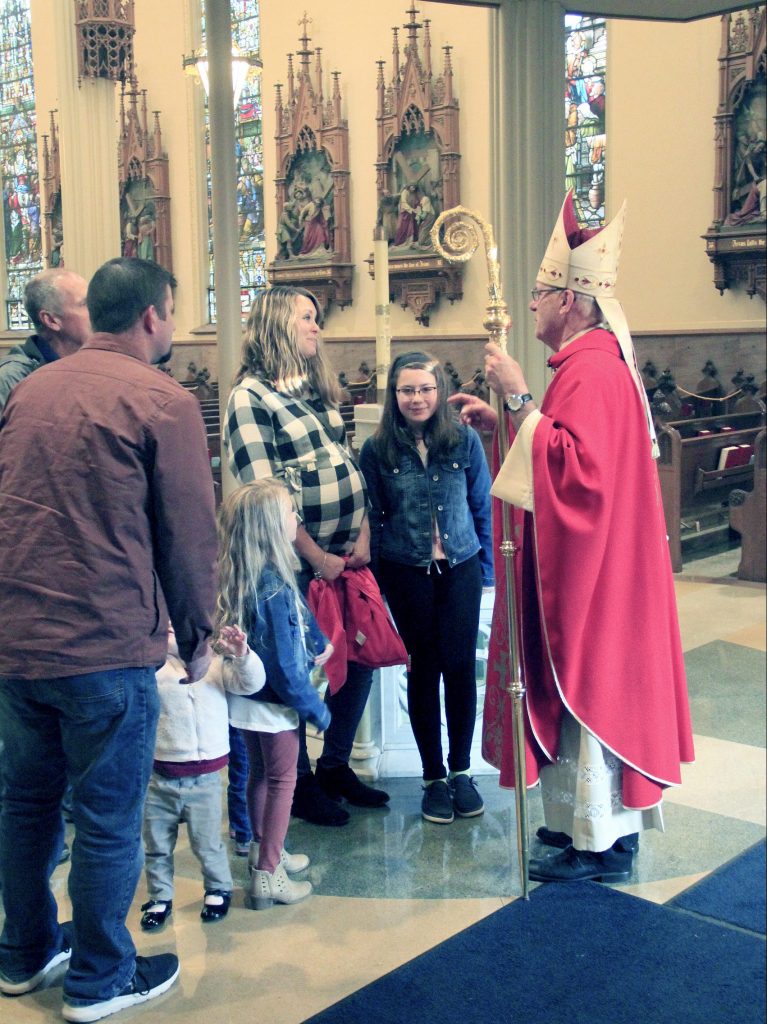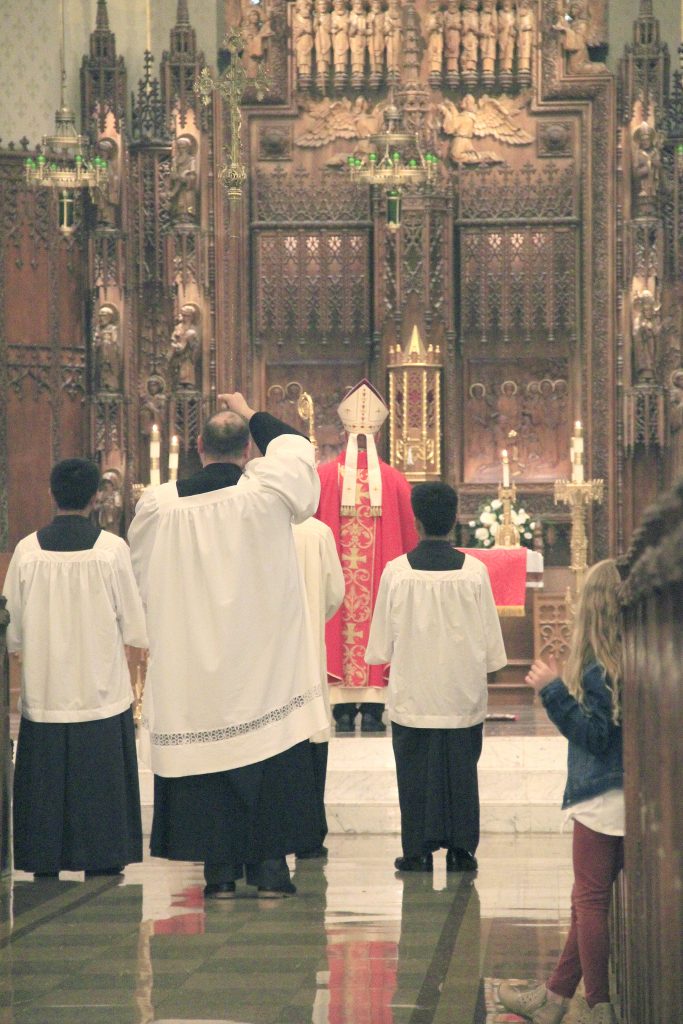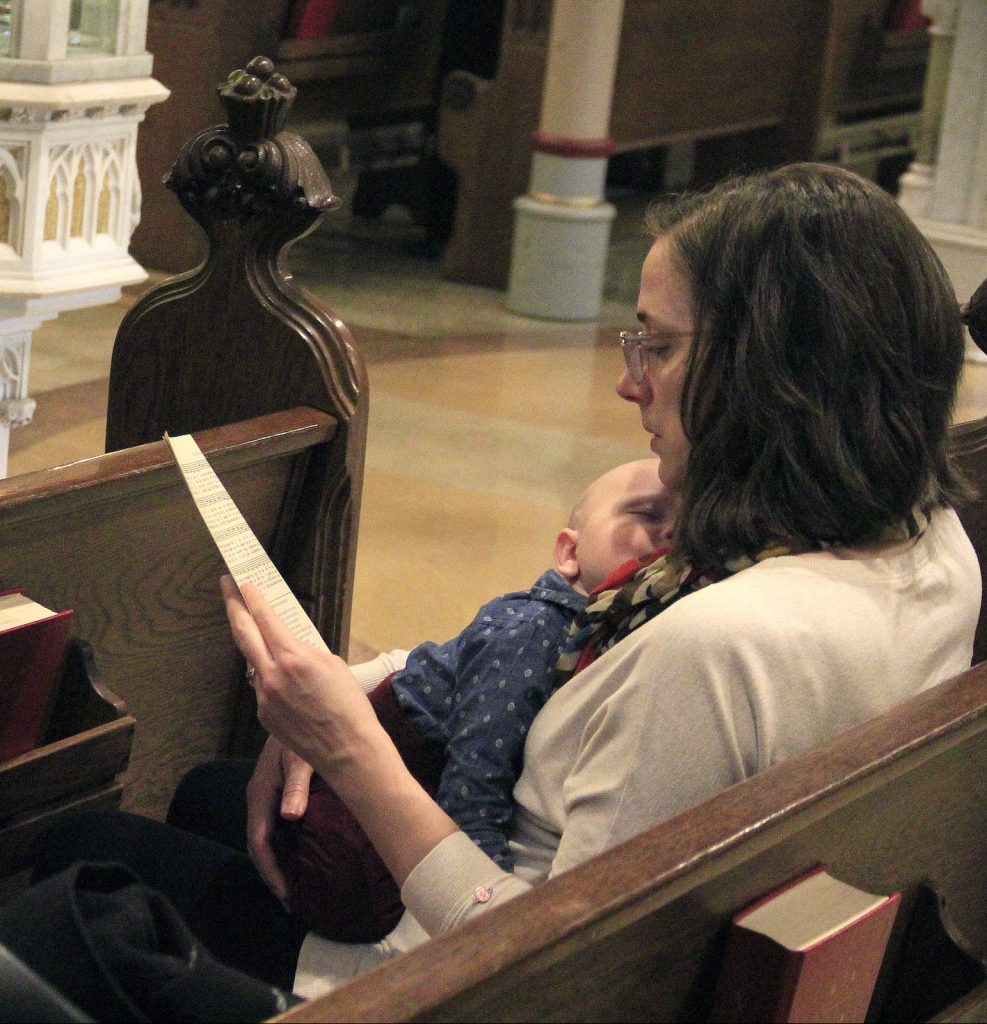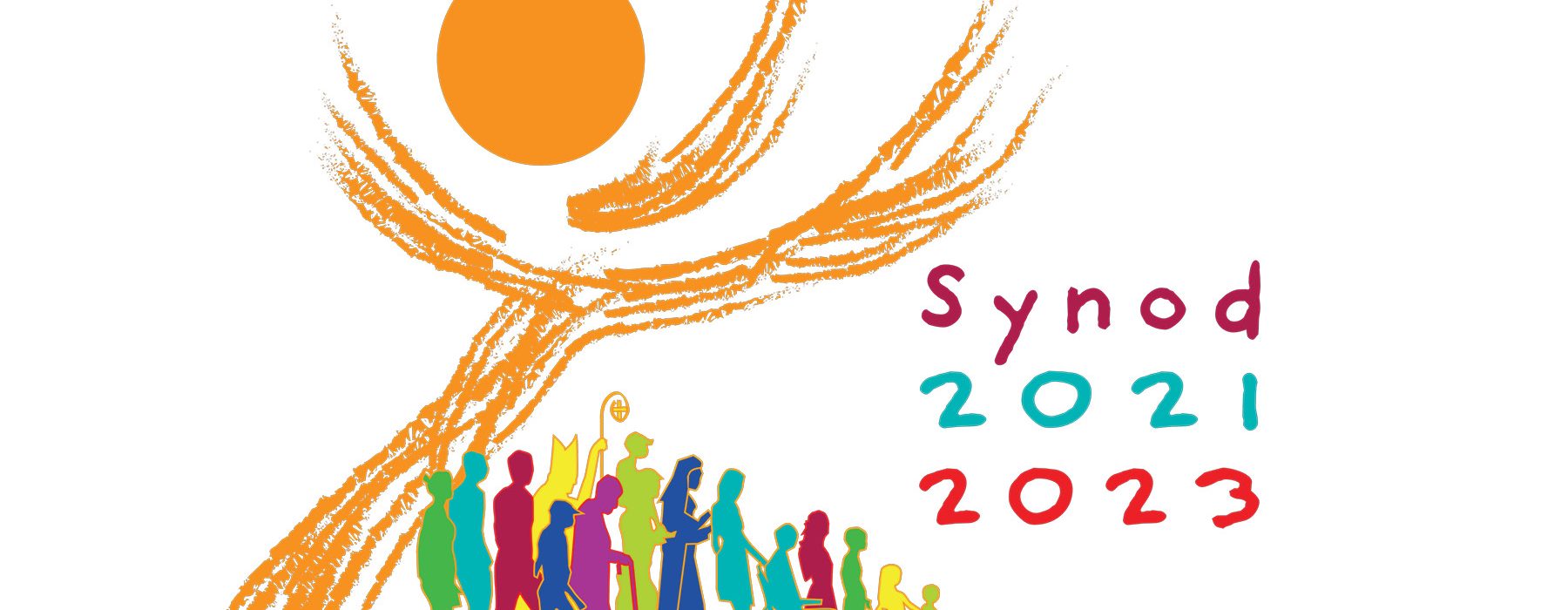October 19, 2021 // Bishop
‘Journeying Together’ as the pilgrim people of God
Bishop opens diocesan phase of synodal process
The following is the text of the homily given by Bishop Kevin C. Rhoades at the Mass opening the diocesan phase of the XVI Ordinary General Assembly of the Synod of Bishops.
At this Mass, here in the mother church of our diocese, we begin the diocesan phase of the 2023 Synod of Bishops on the theme: For a Synodal Church: Communion, Participation, and Mission. Synodality is an integral part of the very nature of the Church. I imagine that most of you, when you hear the word “synod,” you think of a synod of bishops. One of the fruits of the Second Vatican Council was the Synod of Bishops. There have been a number of Synods of Bishops since the Council, including the last Synod in 2018 on young people, faith and vocational discernment.
The Church has become increasingly aware that synodality is the path for the entire people of God. It’s a journeying together of all the faithful since all the baptized, both the hierarchy and the laity, are called to be active participants in the saving mission of the Church. There are a diversity of gifts and charisms among all the faithful for the renewal and building up of the Church. All of us have received the gifts of the Holy Spirit in Baptism and Confirmation.

Photos by Jodi Marlin
A family speaks with Bishop Kevin C. Rhoades after a Mass opening the diocesan phase of the XVI Ordinary General Assembly of Bishops at the Cathedral of the Immaculate Conception, Fort Wayne, Oct. 16. The synod calls for all the faithful, beginning at the diocesan level, to engage in discernment of the will of the Holy Spirit by listening to one another.
Pope Francis has invited the whole Church to reflect on this theme of synodality, the theme of the next World Synod of Bishops. He has asked Catholics throughout the world to be part of the synodal process, to reflect together on our journey as God’s pilgrim and missionary people. He is asking us to reflect prayerfully to discern God’s will for His Church at this time in history. The theme of the Synod, “For a Synodal Church,” has three dimensions: Communion, Participation, and Mission. We are being asked by the Holy Father to be open to the Holy Spirit and thus discern how God is calling us towards deeper communion, fuller participation and greater openness to fulfilling our mission in the world.
In this process, the Holy Father wants the bishops to be attuned to the living voice of the people of God. The objective of this Synod is to listen, as the entire people of God, to what the Holy Spirit is saying to the Church in our time. We do so by listening together to God’s Word in Scripture and Tradition, by listening to one another, especially to the voices of the poor and marginalized, and discerning the signs of the times. The Pope is asking us to dream about the Church we are called to be as we journey together, fulfilling our mission of evangelization in the world today and in the future.
This may sound very new, but we may already experience this style of being the Church on the level of our parishes and on the diocesan level as well, when we listen to one another, dream together, and prayerfully discern together our mission. This happens, for example, in groups like parish pastoral councils, the diocesan presbyteral council, and other groups. I have for many years been thinking about establishing a diocesan pastoral council, which I intend to do in the coming months. The Holy Father is asking us to become even more a synodal Church. In convening this present Synod, in which he is asking all the local churches to participate, he states: “It is precisely this path of synodality which God expects of the Church of the third millennium.”

During the diocesan phase of the XVI Ordinary General Assembly of Bishops, which opened Oct. 16 at the Cathedral of the Immaculate Conception, Fort Wayne, people will be invited to prayerfully participate and share their reflections on the theme of synodality.
The diocesan phase of the Synod, which begins today, will last until April. During these months, there will be gatherings in the six vicariates of our diocese and in parishes within the vicariates where people will be invited to meet and prayerfully share their reflections on this theme of synodality. The fundamental question to be discussed is this: A synodal Church, in announcing the Gospel, ‘journeys together.’ How is this ‘journeying together’ happening today in your local Church? What steps does the Spirit invite us to take in order to grow in our ‘journeying together’?”
One must be careful not to think of the Synod as a political parliament. It is a spiritual process, not a political process. It is oriented toward discernment of the will of God by listening to one another, seeking to discern what God is saying to us today, following the lead of the Holy Spirit. It is about being open to God’s grace by praying, listening, and reflecting. I am hoping that a lot of people will participate in the synodal consultation meetings throughout our diocese and I look forward to receiving the feedback from the meetings. All dioceses in the world are being asked then to write up a diocesan synthesis of this feedback and to submit a 10-page summary to their respective episcopal conferences (here in the United States, the USCCB). The episcopal conferences will then prepare a synthesis of all the feedback from the dioceses which will then be submitted to the Synod Secretariat at the Vatican. All of this feedback, the result of the prayerful reflections of the people of God throughout the world, will then provide the working document for the actual assembly of the Synod of Bishops in 2023. The bishops will have listened to the people of God throughout the world. The bishops, the successors of the apostles, will then discern the path forward, with and under the pope, the successor of St. Peter.
In today’s Gospel, Jesus said to the Twelve that they are not to lord their authority over the people like earthly rulers do. Our Lord says: “Whoever wishes to be great among you will be your servant; whoever wishes to be first among you will be the slave of all. For the Son of Man did not come to be served but to serve and to give his life as a ransom for the many.” Jesus is teaching the apostles and their successors about the humble exercise of authority as service. That’s what synodality entails. As Pope Francis has said, “For the disciples of Jesus, yesterday, today, and always, the only authority is the authority of service and the only power is the power of the cross.” “Jesus founded the Church by setting at her head the Apostolic College (the College of bishops) in which the Apostle Peter (the Pope) is the rock, the one who must confirm his brethren in the faith.” The Church is, therefore, a hierarchical communion. The hierarchy’s authority, under the guidance of the Holy Spirt, is the authority of service. Exercising authority in this Christ-like manner, it seems to me, includes us bishops listening to you, the people of God, as we lead and serve you. In exercising our authority, we are called to discern the Lord’s will, to obey Christ and to listen to the Holy Spirit. That’s what the Synod is all about: listening to the Holy Spirit, the Spirit of truth.

Mary Beth Giltner prays the prayer of synodality while holding son Jack during the Mass.
I entrust this phase of the Synod in our diocese to the intercession of our patroness, Mary, the Immaculate Conception. Our Blessed Mother joined the disciples in praying for the coming of the Holy Spirit on Pentecost. There was a great missionary outburst when the Apostles received the Holy Spirit. May Mary accompany all of us and the Church throughout the world during this synodal process, so that there will be a new missionary outburst in the Church today!
Q&A: The role of every Catholic in the Synod on Synodality
Q: What is the Synod on Synodality?
A: According to the “Vademecum for the Synod on Synodality,” the handbook for the first phase of the synod, by convening this synod Pope Francis invites the entire Church to reflect on a theme that is decisive for its life and mission: “It is precisely this path of synodality which God expects of the Church of the third millennium,” he says in the document.
Enlightened by the Word of God and united in prayer, all Catholics will be able to discern the processes to seek God’s will and pursue the pathways to which God calls them – toward deeper communion, fuller participation, and greater openness to fulfilling their mission in the world. In one word, toward synodality.
According to the handbook, first and foremost, synodality denotes the particular style that qualifies the life and mission of the Church, expressing her nature as the people of God journeying together and gathering in assembly, summoned by the Lord Jesus in the power of the Holy Spirit to proclaim the Gospel.
“In this sense, synodality enables the entire people of God to walk forward together, listening to the Holy Spirit and the Word of God, in order to participate in the mission of the Church in the communion that Christ establishes between us.”
Q: Who participates in the synod?
A: The Synod on Synodality is a Synod of Bishops. This means that the bishops of the world, who will have listened to the people of God throughout the process, will then discern the path forward, with and under the pope, the successor of St. Peter.
In this synod, however, Pope Francis has emphasized a desire to have the opinions of everyone — all the people of God — are to be shared. The “Vademecum” states:
“While the Synod of Bishops has taken place up until now as a gathering of bishops with and under the authority of the Pope, the Church increasingly realizes that synodality is the path for the entire People of God. Hence the Synodal Process is no longer only an assembly of bishops but a journey for all the faithful, in which every local Church has an integral part to play.”
While synodality is based on the baptismal gifts and responsibilities of each Catholic, it is intended that this synodal process should reach out to people “on the margins,” to find out how the Church can reach out to them and serve them in spiritual ways and through charitable works.
Q: What is the aim of this synod?
A: The preparatory document for the synod, received by dioceses Sept. 23, presents its objectives as three-fold.
• Recalling how the Spirit has guided the Church’s journey through history and, today, calls people to be, together, witnesses of God’s love
• (Moving closer to) living a participative and inclusive ecclesial process that offers everyone — especially those who, for various reasons, find themselves on the margins — the opportunity to express themselves and to be heard in order to contribute to the edification of the people of God.
• Recognizing and appreciating the wealth and the variety of the gifts and charisms that the Spirit liberally bestows for the good of the community and the benefit of the entire human family.
Anne Therese Stephens, diocesan coordinator of the synodal process, summed up the goal of the synodal process this way:
“We don’t live alone; we live in community. We are journeying toward eternity, namely heaven, together. In planning the synod in this format, the Holy Father seeks to know how has each individual’s experience been of living in community and journeying toward heaven together?
Q: When will the
process begin?
A: Pope Francis opened the path entitled “For a Synodal Church: Communion, Participation, and Mission” Oct. 9-10 in Rome. The following weekend, Oct. 16-17, this process was formally opened by dioceses around the world with a designated Mass.
Through their pastor or the head of the local vicariate, parish-level consultations will take place this winter. The faithful are encouraged to look to their parish for information on how to participate. By April 1, the diocese will have prepared a summary document on these consultations that it will share with the Vatican.
Q: What am I supposed to do?
A. Everyone, from those in leadership positions to those who are not practicing the faith, are encouraged to prayerfully reflect on the mission of synod and attend the local parish or vicariate meeting and share their experiences, opinions and answers to some of the same questions that will be asked of the diocesan high schools, health care institutions, Catholic Charities and universities, including, “Who are the poor in the community? What is your experience of community in the Church? How can the Church more effectively reach out to you? And, how can the Church better include you?
The preparatory document offers a “Fundamental Question,” one that will guide the consultations.
“A synodal Church, in announcing the Gospel, ‘journeys together.’ How is this ‘journeying together’ happening today in your particular Church? What steps does the Spirit invite us to take to grow in our ‘journeying together’?”
The best news. Delivered to your inbox.
Subscribe to our mailing list today.






